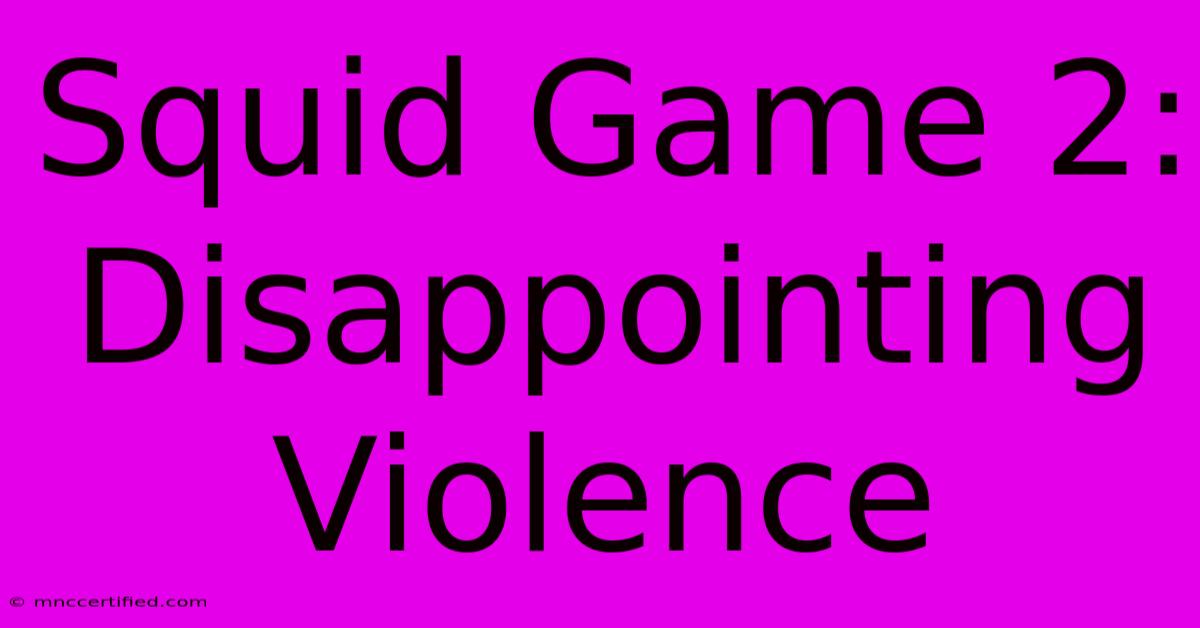Squid Game 2: Disappointing Violence

Table of Contents
Squid Game 2: Disappointing Violence – A Critical Look at the Sequel's Action
The hype surrounding Squid Game 2 was immense. Following the global phenomenon of the first season, expectations were sky-high. However, many viewers felt the sequel fell short, particularly concerning its depiction of violence. This article delves into the criticisms surrounding the violence in Squid Game 2, exploring why it failed to resonate with audiences and analyzing its impact on the overall narrative.
The Problem with the Violence in Squid Game 2
While the original Squid Game utilized violence effectively to highlight the brutal desperation of its characters and the exploitative nature of the games, Squid Game 2 seems to have misjudged the tone and execution. Several key issues contribute to the widespread disappointment:
1. Excessive and Gratuitous Violence:
The sheer amount of violence in Squid Game 2 surpasses the original's level considerably. Instead of serving a narrative purpose, the violence often feels gratuitous, overwhelming the audience with a relentless barrage of gore and bloodshed. This excess diminishes the impact of the individual acts of violence, making them less emotionally resonant. The original's power lay in its selective use of violence; its scarcity made each moment impactful.
2. Lack of Emotional Resonance:
The violence in the first season was disturbing, yes, but also deeply tragic. We saw the desperation in the players' eyes, their struggle for survival, and the human cost of the games. This emotional connection was largely absent in the sequel. The characters often felt less developed, making the violence they suffered less affecting. The audience had less investment in their fates, reducing the emotional weight of the brutal scenarios.
3. Shift in Tone:
The original Squid Game maintained a careful balance between brutal reality and darkly comedic moments. This contrast made the violence more palatable while still maintaining its shocking nature. Squid Game 2, however, appears to have shifted towards a more purely violent and grim aesthetic, losing the subtle humor and social commentary that made the first season so compelling. This tonal shift alienated many viewers who appreciated the nuanced approach of the original.
Comparing the Violence: Squid Game vs. Squid Game 2
The key difference lies in the purpose of the violence. In the first season, the games themselves served as a powerful metaphor for societal inequalities and the desperation of those trapped in a system rigged against them. The violence underscored the brutal consequences of this system. In Squid Game 2, the violence often feels like an end in itself, lacking the same sharp social critique and thematic depth.
The original's violence was disturbing, yes, but it also felt earned and meaningful within the context of the narrative. Each game held a symbolic weight, reflecting larger societal issues. Squid Game 2, however, often employs violence for shock value alone, sacrificing narrative coherence and emotional impact for gratuitous spectacle.
The Impact on the Overall Narrative
The excessive and poorly executed violence in Squid Game 2 has arguably damaged the overall narrative. Instead of enhancing the story, it overshadows other aspects, diminishing the character development, plot progression, and thematic exploration. The relentless focus on graphic violence distracts from the potentially insightful commentary the series could have offered.
Conclusion: A Missed Opportunity
Squid Game 2's disappointing violence represents a significant misstep. The sequel's creators seem to have mistaken the shock value of the original for its core strength. The effective use of violence in the first season was carefully crafted to serve the narrative and social commentary. Squid Game 2, however, employs violence haphazardly, resulting in a less engaging, less impactful, and ultimately, less successful sequel. It highlights the critical importance of purposeful storytelling, even within a genre known for its extreme content. The sequel serves as a cautionary tale: violence, for its own sake, is rarely compelling.

Thank you for visiting our website wich cover about Squid Game 2: Disappointing Violence. We hope the information provided has been useful to you. Feel free to contact us if you have any questions or need further assistance. See you next time and dont miss to bookmark.
Featured Posts
-
Feathers Mc Graw Wallace And Gromit Crossover
Dec 26, 2024
-
Worth Finds Love Coronation Street Star
Dec 26, 2024
-
J Los Ripped Jeans And Platform Boots Look
Dec 26, 2024
-
Strictlys Billy Monger Off Screen Story
Dec 26, 2024
-
Helen Worths Coronation Street Farewell
Dec 26, 2024